|
|
 |
|
Calanoida ( Order ) |
|
|
|
Clausocalanoidea ( Superfamily ) |
|
|
|
Aetideidae ( Family ) |
|
|
|
Chiridiella ( Genus ) |
|
|
| |
Chiridiella macrodactyla Sars, 1907 (F) | |
| | | | | | | Syn.: | no Chiridiella macrodactyla : A. Scott, 1909 (p.79, figs.F); no Farran, 1908 b (p.46, figs.F); no Tanaka, 1957 a (p.57, figs.F); Tanaka & Omori, 1970 b (p.153);
? C. abyssalis : Johnson, 1963 (p.92, fig.F) | | | | Ref.: | | | Sars, 1907 (p.8, Descr.F); Sars, 1925 (p.50, figs.F); Farran, 1926 (p.248); Rose, 1933 a (p.95, figs.F); Lysholm & al., 1945 (p.16); Vervoort, 1952 c (n°44, p.3, figs.F,M); Østvedt, 1955 (p.14: Table 3); Vervoort, 1963 b (p.156, Rem.); Bradford, 1971 b (p.21, Rem.); Deevey, 1974 (p.456, 458, 469, figs.F); Markhaseva, 1996 (p.99, figs.F, Rem.); Chihara & Murano, 1997 (p.683, Pl.33: F); Boxshall & Halsey, 2004 (p.59: fig.F); Vives & Shmeleva, 2007 (p.557, Rem.F) | 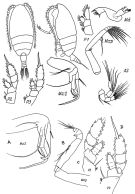 issued from : E.L. Markhaseva in Proc. Zool. Inst. RAN, St. Petersburg, 1996, 268. [p.100, Figs.74, 75]. Female (from Sars, 1924); A, B, C, D from specimen of N Atlant. (from Markhaseva, 1996).
|
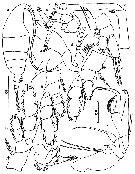 issued from : G.A. Deevey in Bull. Mar. Sc., 1974, 24 (2). [p.464, Fig.15]. Female (from 32°10'N, 64°10'W): a, habitus (lateral); b, A2; c, Mxp (endopod setae not shown); d, Md; e, P1; f, P2; g, P4; h, P3; i, Mx1; j, Mx2. Scale on left margin for part a; at lower right for parts b-j. Scales in mm. Nota : For Deevey (1974, p.465) it is some hesitation that the specimenns are identified as C. macrodactyla
|
 issued from : G.A. Deevey in Bull. Mar. Sc., 1974, 24 (2). [p.464, Fig.15]. Female (from 32°10'N, 64°10'W): a, habitus (lateral); b, A2; c, Mxp (endopod setae not shown); d, Md; e, P1; f, P2; g, P4; h, P3; i, Mx1; j, Mx2. Scale on left margin for part a; at lower right for parts b-j. Scales in mm.
|
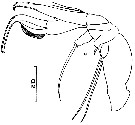 issued from : G.A. Deevey in Bull. Mar. Sc., 1974, 24 (2). [p.467, Fig.17c]. Female: c, Mx2. Scale in mm.
|
 Chiridiella macrodactyla Chiridiella macrodactyla female: 1 - Mx2 with 5 endites. 2 - Mx2 strongly modified in comparison with typical; first-fifth endites of varying size; Setation is not typical, some number of setae on third-fifth endites transformed into pincers-like spines. 3 - Setae of fourth endite of Mx2 arranged like pincers. 4 - Endopodal segment 2 of Md with 3 setae. Mx1 with exopod, exopod with 4 setae. 5 - Protopodite of Mxp with 2 setae in distal group. 6 - P3-P4 with 3-segmented rami.
|
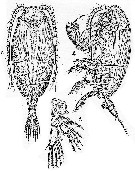 Issued from: G.O. Sars in Résult. Camp. Scient. Prince Albert I, 69, pls.1-127 (1924). [Pl.XVI, figs. 1, 2, 9]. Female (from Azores Islands): 1-2, habitus (dorsal and lateral, respectively); 9, P1.
|
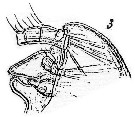 Issued from: G.O. Sars in Résult. Camp. Scient. Prince Albert I, 69, pls.1-127 (1924). [Pl.XVI, fig. 3]. Female: 3, forehead (left lateral view), showing prominent labium and labium..
|
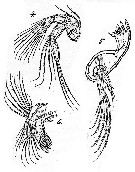 Issued from: G.O. Sars in Résult. Camp. Scient. Prince Albert I, 69, pls.1-127 (1924). [Pl.XVI, figs. 4, 5, 6]. Female: 4, A2; 5, Md; 6, Mx1.
|
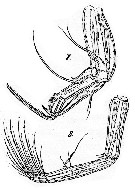 Issued from: G.O. Sars in Résult. Camp. Scient. Prince Albert I, 69, pls.1-127 (1924). [Pl.XVI, figs. 7, 8]. Female: 7, Mx2; 8, Mxp.
|
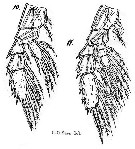 Issued from: G.O. Sars in Résult. Camp. Scient. Prince Albert I, 69, pls.1-127 (1924). [Pl.XVI, figs. 10, 11]. Female: 10, P2; 11, P4.
|
 Chiridiella macrodactyla Chiridiella macrodactyla female ; 1 - Penultimate lobe of Mx2 with 1 long and 1 short spine arranged as pincers. 2 - Mx2 with 4 or 5 lobes. 3 - A1 not extending beyond genital segment. 4 - Proximal lobe of Mx2 with 2 long setae. 5 - 1st basipod segment of Mxp with 2 distal setae, 2nd segment with 3 setae.
| | | | | Compl. Ref.: | | | Damas & Koefoed, 1907 (p.400, tab.II); Østvedt, 1955 (p.14: Table 3, p.61); Sewell, 1948 (p.499, 546, 550); C.B. Wilson, 1950 (p.188); De Decker & Mombeck, 1964 (p.11); Grice & Hulsemann, 1965 (p.223); 1967 (p.14); Roe, 1972 (p.277, tabl.1, tabl.2); Björnberg, 1973 (p.323, 38); Deevey & Brooks, 1977 (p.256, Table 2, station "S"); Vives, 1982 (p.291); Lozano Soldevilla & al., 1988 (p.58); Shih & Young, 1995 (p.66); Suarez-Morales & Gasca, 1998 a (p.107) | | | | NZ: | 7 + 2 doubtful | | |
|
Distribution map of Chiridiella macrodactyla by geographical zones
|
| | | | | | | | | | Loc: | | | South Africa (E), G. of Guinea, off Morocco-Mauritania, Canary Is., W Africa, Brazil, Azores, Caribbean Sea, Sargasso Sea, Station "S" (32°10'N, 64°30'W), Bay of Biscay, ? W Ireland, ? Norway Sea, Indian, ? Halmahera Sea, China Seas (South China Sea), N Chile.
Type locality Azores Islands. | | | | N: | 20 | | | | Lg.: | | | (1) F: 2,7; (14) F: 3-2,6; (37) F: 2,65-2,35; (38) F: 2,8-2,56; (199) F: 2,66-2,58; {F: 2,35-3,00} | | | | Rem.: | Meso-bathypelagic. Sargasso Sea: 500-1500 m (Deevey & Brooks, 1977, station "S");
For Vervoort (1963 b, p.156) among the Aetideidae the position of the genus Chiridiella is very isolated and the systematical position, in absence of males is obscure.
Certain locality records would be doubtful (notably in the Pacific).
For Deevey (1974) and Markhaseva (1996) the species reported under this name by Farran (1908 b) is not correct.
See remarks Chiridiella ovata.
Markhaseva (1996, p.99) otes the inadequancy and sometimes contradictory nature of the species descriptions, making the status of this species rather obscure. Three females attibued by the author as C. macrodactyla were found in the Antarctic (Indian sector) and NE Atlantic: their cephalon and 1st thoracic segment incompletely separated; endopod of P3-P4 3-segmented (subdivision incomplete). The specimens differ from C. macrodactyla described by Sars (1924-25) and Deevey (1974) with respect to endopodal segment 2 of Md and protopodite of Mxp setation. C. ovata Deevey (1974) and C. abyssalis Brodsky (1950) are similar to C. macrodactyla. C. macrodactylaW differs from C. abyssalis in 3-segmented of P3-P4 rami; from C. ovata in presence of 2 (not 1) setae in distal group on Mxp protopodite; from C. sarsi in number of setae on exopodal 2 of Md (5 setae) and in smaller size. | | | Last update : 02/09/2021 | |
|
|
 Any use of this site for a publication will be mentioned with the following reference : Any use of this site for a publication will be mentioned with the following reference :
Razouls C., Desreumaux N., Kouwenberg J. and de Bovée F., 2005-2026. - Biodiversity of Marine Planktonic Copepods (morphology, geographical distribution and biological data). Sorbonne University, CNRS. Available at http://copepodes.obs-banyuls.fr/en [Accessed February 20, 2026] © copyright 2005-2026 Sorbonne University, CNRS
|
|
 |
 |











